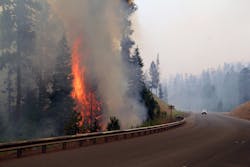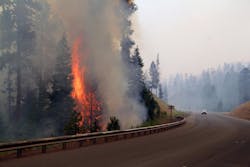From Hurricane Harvey in Texas, Irma in Florida, and wildfires in the west, a large portion of the United States has been impacted by natural disasters this summer.
Even with the damage from these events estimated at many billions of dollars, it appears things could have been far worse, had there been significant damage to oil refineries or more areas that serve as major freight transportation hubs.
As several new storms were churning in the Atlantic last week, I spoke about the state of the transportation industry’s preparedness with Bernie Kavanagh, general manager for North America large fleet at WEX Inc.
Kavanagh, whose company offers fuel cards, payment processing, and other services, said he believes this summer’s events have been widespread enough for most transportation firms to take note.
“Many things can get taken for granted, or you just don’t realize the importance until it is too late,” he said.
Media coverage is also helping.
“Years ago, we didn’t realize the impact of some of these storms,” Kavanagh said. Now, however, we all see it on television and better understand how it affects the supply chain, even for those potentially located far away, he added.
Kavanagh’s advice for fleets is to think more about “things that can be done well in advance,” rather than being reactive.
In particular, he recommended fleets look at their fuel purchasing programs. While they may normally allow a maximum of two fueling transactions in a day, they should consider an emergency profile that removes limits and can be put in place ahead of serious events.
“How quickly can you change controls?” Kavanagh said carriers should ask themselves.
He also said fleets should review their fuel supply agreements, and secure a relationship with an emergency fuel responder or mobile fuel provider in the event of natural disasters.
“If doesn’t cost anything but you can get fuel there if needed,” he said.
He compared the idea with fleets that hedged on fuel prices several years back when diesel was more than $4 a gallon.
Even though prices have remained lower for a number of years, making hedging a potentially unattractive option at the moment, “that doesn’t mean you shouldn’t be prepared,” he said.
Looking back to the aftermath of Hurricane Katrina in 2005, Kavanagh recalled stories of tanker trucks trying to provide fuel to truckers, only to realize they did not have the correct nozzle for transferring to individual vehicles.
“We’ve learned a lot of lessons,” he said, adding that the increased use of telematics and social media has helped make it easier to overcome these difficult situations.
Let’s hope we all continue to learn lessons from this summer’s natural disasters as well.
About the Author
Neil Abt
Neil Abt is a former FleetOwner editor who wrote for the publication from 2017 to 2020. He was editorial director from 2018 to 2020.


